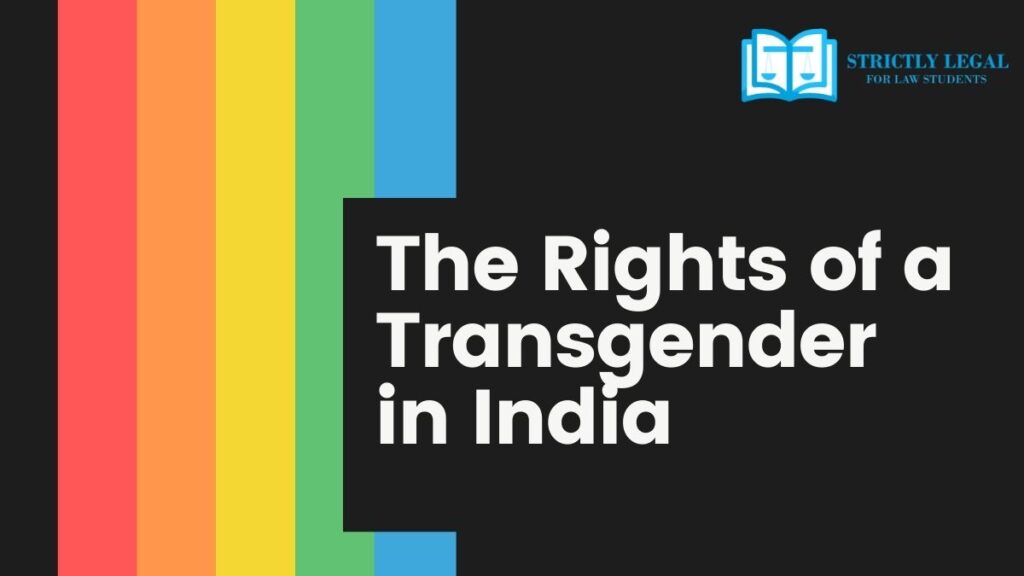“Transgender”, the term itself stands out from the stereotypical identities and gender norms. The society has been modernized to a great extent compared to the early 70s or 80s, nonetheless, the idea and concept of a transgender are still not accepted completely in the society of India, although it is not new. As a result of which, people belonging to such identity are having to face discrimination, physical violence and social oppression. Among the transgenders at large, there are a certain socio-cultural group of people who are identified as hijras, jogappas, sakhi, aradhis etc, and there are people who do not have any tag unlike others but simply belong to the identity of “transgenders”. As the Constitution of India guarantees justice and equality to every citizen of India, likewise the rights of a transgender are equally guaranteed. The Government has enacted the Transgender Person (Protection of Rights) Act, 2019 in order to prohibit discrimination against transgenders in the field of employment, education, and health services and certain welfare measures have also been adopted to safeguard the rights of a transgender.
Table of Contents
Who is a transgender?
People belonging to the group or identity of a transgender are taken to be as the people whose gender identity is different from the gender they were thought to be when they were born. Technically, a Transgender person means “a person whose gender does not match with the gender that was assigned to them at their birth but they are the persons with intersex variation and genderqueer”. People from the identity of Transgenders try expressing themselves in various ways. Some adopt the dressing style, some use behavior or mannerism to live like a soul and a gender whom they feel is right physically as they disagree to identify themselves as the usually expected gender of a male or a female, rather consider themselves as a third gender or a genderqueer or a transgender.
Rights of a Transgender in India
Transgender people are different from the usual stereotypical concept of a man and a woman, rather they have a different physical appearance, different characteristics and different behavioral traits. Being far away from usual people have termed them as “weird” and for the same reason, transgender people are having to face discrimination in the workplace, schools, colleges etc, and social oppression as the so-called modernized society still does not accept them as a specific third gender. The difficult and torturous problems they face in life are alcohol abuse, lack of health care and sanitation, lack of education and employment, and lack of recognition in the society. To safeguard their rights and help them from having to face such problems, the Constitution of India has provided them with their own rights, and the Honorable Apex Court has given them the right to be recognized as a “Third Gender” in the case of National Legal Services Authority v. Union of India which acts no less than a boon to them.
Rights of a Transgender under Indian Constitution
The Policy of Indian societies and states earlier recognized only two sex I.e., Male and Female and had impoverished the third gender from their rights being the citizens of India such as the right to vote, right to marry, right to own a property, and mainly their right to education employment and health and sanitation. They are impoverished from the basic fundamental rights that are promised to every citizen of India by the Constitution. The first time the rights of s transgender were taken into consideration was when the NALSA judgment was passed back in 2014, where the Honorable Apex Court especially threw light on safeguarding the rights of a transgender person under the principles of the Constitution of India laid down in Article 14, 15, 16 and 21.
In one of the highlighted case of Navtej Singh v. the Union of India, Section 377 of the Indian Penal Code was decriminalized since the primary issue of the case laid in the Constitutionality of the provision that was mentioned in the IPC, which stated that “voluntarily carnal intercourse against the order of nature with any man, woman or animal shall be with punished with imprisonment for life, or with imprisonment which may extend to ten years with a fine.” The petition was filed specifying that Section 377 of the Indian Penal Code is violating the right to privacy, equality, freedom of expression and protection against discrimination. The petitioner in his writ petition mentioned that the right to choose one’s sexual partner, to ask for recognition of the right to sexuality and the right to sexual autonomy is promised and guaranteed under Article 21 of the Constitution of India. After analyzing every aspect of the case, the Honorable Apex Court finally contended the judgment in the favor of the petitioner stating Section 377 should be decriminalized and confirming that homosexuality is not an anomaly but a different sexuality. The Honorable Court further added that discrimination on the basis of someone’s sexuality is violative of article 21 and article 14.
Human Rights Violation
They are impoverished of social and cultural participation which portrays that they have confined access to education, health, employment and access to public places which again impoverishes them from their Fundamental Right guaranteed by the Constitution of India of equality before the law and equal protection before the law. The community of Transgenders faces discrimination in almost every aspect of life and is, therefore, less accessible to the opportunities that society provides to any individual. Hardly any individual belonging to this community gets a job due to the strict criteria of gender of male and female while selecting candidates.
Directions to the central and state government
The court as issued certain directions to the central and state government which are:
- The Hijras and eunuchs and others such from the community shall be treated as the third gender for the purpose of protecting their fundamental rights guaranteed under the Constitution of India.
- Acknowledge the person’s need to identify his own gender,
- Providing reservations in public education and employment as the socially and educationally backward class of citizens (SEBC),
- Creating special provisions regarding HIV zero-surveillance for transgender persons and providing suitable health facilities,
- Pulley their problems such as fear, gender doldrums, shame, depression, suicidal tendencies, etc.
- Steps should be taken to provide health care to transgender people in hospitals such as making separate wards and also provide them separate public toilets,
- Frame social welfare schemes for their all-round development,
- To create public awareness so that the transgenders feel that they are part of the society and are not to be treated as untouchables.
Conclusion
In order to uplift the community and prevent them from any sort of discrimination, the Right of Transgender Person Bill, 2014 was passed unanimously with the cross-party support. Rights guaranteed under the bill were mostly substantial rights such as the right to equality and non-discrimination, life and personal liberty, free speech, integrity, and to live in a community along with shielding them from torture, physical or sexual abuse and cruelty, violence and exploitation. However, separate clauses were put for transgender children.

Law student.
Turning legal insights into engaging narratives.




